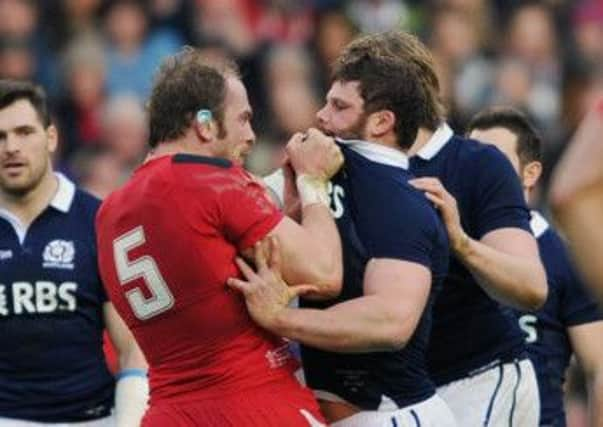Six Nations: Ref calls time on Scotland comeback


Home stand-off Finn Russell was sin-binned late in the first half, and was followed into the bin minutes later by Wales centre Jonathan Davies. But despite several penalties being awarded against the Welsh late on as Scotland rallied, no-one else was shown a card.
Down 26-16 going into the final minute of the 80, Scotland scored a try through Jon Welsh. The instant the ball went dead after Russell’s conversion was timed at 79 minutes 54 seconds by the official Six Nations statisticians, which appeared to leave a few precious seconds for the game to be restarted – even if it took Russell longer than those six seconds to get back into his own half.
Advertisement
Hide AdAdvertisement
Hide AdBut, after a brief consultation with assistant referee George Clancy, who may not have looked at the clock at that precise second, Jackson ruled that the full 80 minutes had elapsed and blew his final whistle.
Law 5.7 states: ‘If time expires and the ball is not dead, or an awarded scrum or lineout has not been completed, the referee allows play to continue until the next time that the ball becomes dead. The ball becomes dead when the referee would have awarded a scrum, lineout, an option to the non-infringing team, drop out or after a conversion or successful penalty kick at goal.
‘If time expires after a try has been scored the referee allows time for the conversion kick to be taken.’
FOLLOW US
SCOTSMAN TABLET AND MOBILE APPS
Under this law, it appears the referee’s decision was correct, although there is no specific reference to time expiring between a conversion and a re-start.
Other controversial decisions in an exciting encounter at BT Murrayfield included the chalking-off of a second-half ‘try’ by Mark Bennett and the ruling on the verge of half-time that Laidlaw had just failed to touch down over the Welsh line.
Cotter accepted such contentious rulings were hard to take but said Scotland could not afford to dwell on them.
“I thought they [the match officials including the TMO] could have had a look at Greig’s try,” Cotter said.
“I thought when Sam Hidalgo-Clyne hit the ground, he could have looked at that and maybe given us a try earlier.
Advertisement
Hide AdAdvertisement
Hide Ad“There are a lot of things we don’t have control of. I don’t want to lose a lot of energy talking about it, because it isn’t going to change the result.
“What we can do is take some positive things out of the game and things we have improved from from Paris [when Scotland lost 15-8], and for me that is encouraging. This game illustrates areas we need to work on.”
Asked if the officials’ rulings made defeat harder to take, Cotter continued: “Yeah, it is hard to take, but it’s done. There were three penalties inside their 22 in the last 15 minutes.
“I thought some of those errors might have been cynical as well and maybe deserved a yellow card, but obviously not. That’s the way it is. We deal with reality. The reality is that we got close and showed some good signs and played some good rugby, but we have to improve on our high-ball reception.”
Skipper Laidlaw, who had been replaced by Hidalgo-Clyne, suggested the referee would realise he had made a mistake in calling time on the match when he did. “The ref will have to look at that. From where I was sitting, there was time to take the kick.
“Whether we would go on to score was a different matter - we’ll never know that. It looks as though [there was time for another play], and the majority of the stadium felt the same, but maybe the TV clock is different, I don’t know.
“I felt it was a tight test match. The result shows that. We scored a great try in the first half but fell away a wee bit after that. We finished very strongly in the end there and I was disappointed not to get anything out of that.”
Asked if he thought he had scored a try, the captain added: “I’m not sure. I was close, but not sure I got there or not.
Advertisement
Hide AdAdvertisement
Hide Ad“It’s very frustrating. We talked about small margins after the result out in Paris. As Vern said, we’ve got to keep working and improve our game. This group of players is becoming a strong team. I really believe we’re not far away, and we need to keep believing. We’ve got a massive game against Italy at home, and all that matters now is that we turn up in that game and get a positive result.”
He added: “It was a tough game. Credit to Wales for holding on. Rome wasn’t built in a day, this team, we are team on a journey with Vern Cotter but it was a frustrating day for us.”
The closest Cotter came to revealing his frustration was when he was asked if he would get a chance to voice his frustrations about the referee, and said that he would make his feelings know in Scotland’s official report on the match to the RBS Six Nations Championship committee. “We’re in constant communication with them. We’ll try and send something through that will help them, perhaps.”